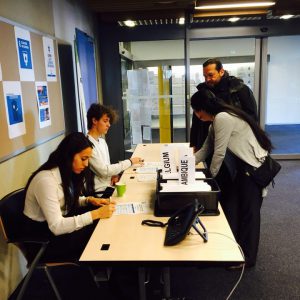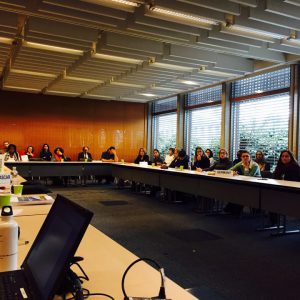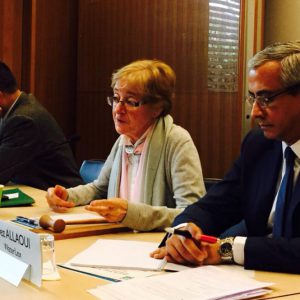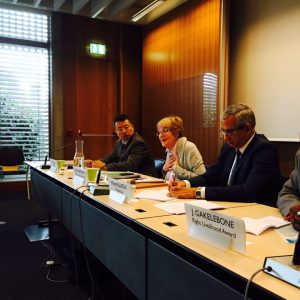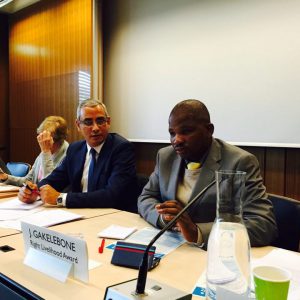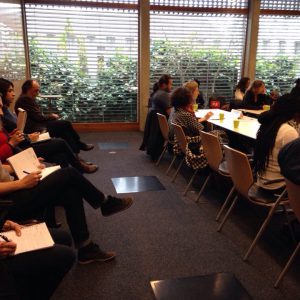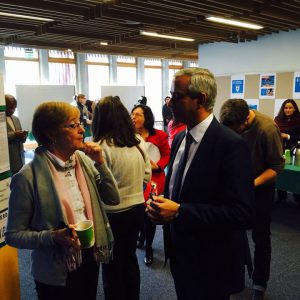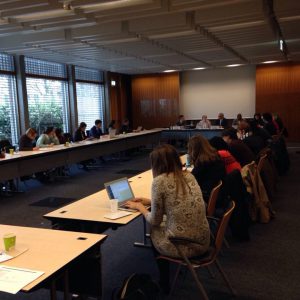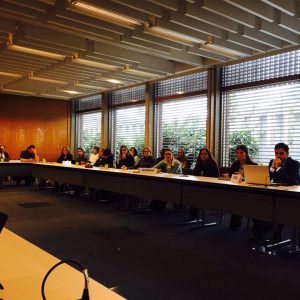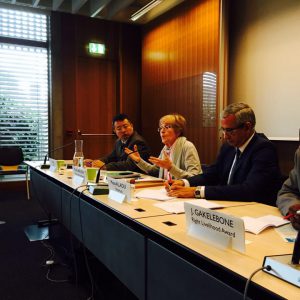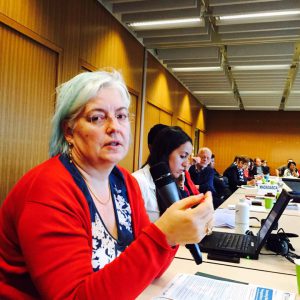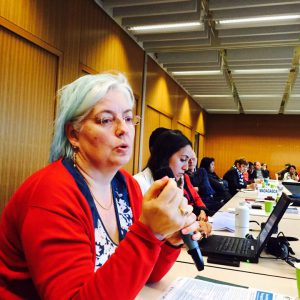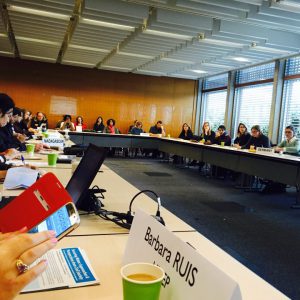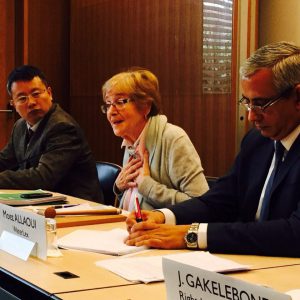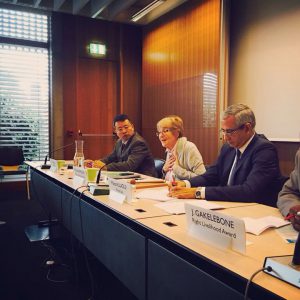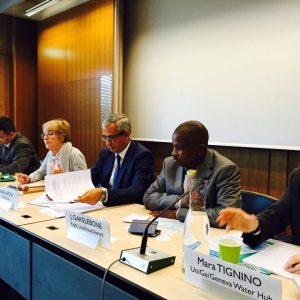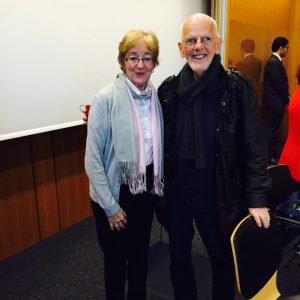Event
Securing Water: Approaches & Perspectives from Civil Society
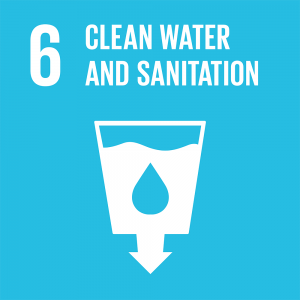
Reaching the Objectives of the 2030 Agenda for Sustainable Development
At the United Nations Sustainable Development Summit on 25 September 2015, world leaders adopted the new 2030 Agenda for Sustainable Development, including the Sustainable Development Goals (SDGs). The Agenda includes a dedicated goal on water and sanitation (Goal 6 – Ensure availability and sustainable management of water and sanitation for all) and clear linkages to other Goals.
As it will be raised at the forthcoming UN High-Level Water and Sanitation Days in New York (18-20 November), reaching the ambitious objectives of the 2030 Agenda demands that we address universal access to drinking water and sanitation along with issues of quality and supply, in tandem with improved water management to protect ecosystems and build resiliency.
A roundtable discussion “Securing Water: Approaches & Perspectives from Civil Society – Reaching the Objectives of the 2030 Agenda for Sustainable Development” with water activists to discuss the meaningfully contribution of civil society to implement and help achieving water-related SDGs, took place at the International Environment House on Monday 23 January.
Agenda
12:30
Welcome remarks
12:35
Roundtable discussion with
Maude BARLOW, Right Livelihood Award Laureate 2005 – Canada
Jumanda GAKELEBONE, Right Livelihood Award Laureate 2005- Botswana
Lifeng LI, Freshwater Director, WWF International
Mara TIGNINO, Senior Lecturer and Coordinator, Platform for International Water, Faculty of Law, University of Geneva/The Geneva Water Hub
Moderator: Moez ALLAOUI, Senior Legal Desk Officer, Waterlex
Debate – Interaction with the audience.
14:15
End
Panel Discussion
Diana RIZZOLIO, coordinator of the Geneva Environment Network, welcomed the partcipants and introduced the chair, Moez ALLAOUI, Senior Legal Desk Officer at Waterlex, an international non-governmental organization fighting to improve water governance worldwide, which secretariat is based in Geneva. She mentioned the presence of two Right Livelihood Award Laureates.
This summer, the Right Livelihood Award Foundation opened an office in Geneva. Sharan SRINIVAS, Director of Research and Advocacy at the Right Livelihood Award Foundation, briefly introduced his institution and announced an upcoming event with the participation of the 2015 laureates, to take place on 2nd December, at the Graduate Institute.
In his introduction Moez ALLAOUI remembered that the UN General assembly adopted the SDGs in September, establishing a specific goal on water with specific target, clean water and sanitation by 2030 (Goal 6). More and more countries are recognizing this human right. On the panel four high level experts on water who will address this topic from different angles according to their experiences and backgrounds.
Maude Barlow
Could you explain what was the role of civil society in establishing the recognition of the human right to water and sanitation in 2010?
- Maude spoke about the global grassroots campaigns.
- Water wars over privatization of water struck a nerve in communities.
- Uruguay was the first country in the world to declare water a human right in their constitution.
- 122 countries voted in favor of water being a human right.
- The issue of water as a tradable good confounded us and started this movement.
- Civil society the main driver of making water a human right and to have it understood in a collective way.
Since this important milestone in 2010, international recognition of right to water, beyond this legal recognition, what are the challenges of implementation of this right?
- A number of communities have used the legal process in cases that they’re fighting in their own countries.
- Since the year 2000, 235 country municipalities who tried privatization went back to public service, including big municipalities such as Paris and Berlin.
- No enforcement of these agreements, it does go back to civil society to make sure their governments implement the right. Government are in the end responsible. Issues: lack of follow through, in first nations communities they’re moral, ethical agreements, civil society has to sit on their governments.
- Worsening ecological crisis, planet running out of water.
- Aquifers are in trouble. According to NASA data 37 major aquifers on our planet and 31 are at trouble.
- Governments are making water a business instead of providing it to the poor. Water getting cut off in cities, growing inequalities, all because people cannot afford high water rates.
- Trade agreements, contain ISDS provision for investers, and have stringent laws against human rights to water. American corporations suing over environmental standards. The European parliament has adopted this legal document for enforcement for water.
- Many of us have the myth of abundance – that we will always have water. That has to be changed. It’s wrong. Demand for water in our world is going up and supply is going down. We tend to see water as a resource for economic development instead of an essential need. Water moves uphill to money – very bad management of water and bad mindset.
- Water shouldn’t be a resource for profit, pleasure, convenience. “America will be great when she learns to conquer her water” – privatization, regulation of water. Bad mindset.
- We need a new water ethic, the greatest human rights threat. Every policy, the way we grow food, the way we produce food, energy, we must ask what is the impact on water? If it affects it negatively, back to the drawing board.
- Water: 1. Human right; 2. Public trust – not appropriated for private good; 3. It has rights too – adapt laws to protect it. 4. Water can teach us how to live together – wonderful entry to a peaceful world.
Lifeng Li
What could be the role of civil society in terms of water management given the specific targets in the SDGs?
- There’s many ways to raise awareness, private sector can become a template for financial investment and technological innovation.
- From WWF perspective, water allocation priority is to meet human basic need, then give water to rural, agricultural, aquifer systems – when these systems collapse we can’t talk about development. The rest should go to economic use.
- Tools to assess water risks and how to address them – these are popular in private sector. The World Economic Forum published a report with tools to understand water risk. It is important to assess water risks and how it can be addressed by private sector and other water users. This helps to develop internal actions and collective actions to reach out to their community.
- Water is everyone’s business and responsibility.
How can tools such as the water footprint help implement and monitor realization of SDG?
- WWF strongly believes that water doesn’t come from the tap, it comes from nature. When ecosystems run out of water we can’t talk about access and development.
- NGOs, private, and public sector must Influence the development and environment of large water infrastructures which can provide lots of services. Put infrastructure in the right places and manage them properly.
- Look at water governance at different levels. We have to look at water allocation priorities.
Do you think that these targets are achievable given that only a few countries have ratified them so far, and the deadline is 2020?
- Overall the targets are ambitious, but if they weren’t we would not get implementation.
Jumanda Gakelebone
What was the role of your organization to make access to water effective in Botswana?
- Jumanda represents bushman in the desert, where there is only water when it rains.
- Jumanda organization discusses water and the rights of his people.
- Water is a basic need in Botswana.
- More an more difficult with climate change to get water.
- Not enough rain, very difficult to get water. Water is a basic human right need.
- Water has been used as a weapon to neglect us from our land rights. For those wo resist water used as punishment.
- Government uses water to displace people.
- Indigenous communities vulnerable to water scarcity.
In terms of implementation, how can you imagine this SDG realized?
- Have people meet together. Information of UN guidelines on this topic should be made public, as local communities have not yet been informed on what the UN has been discussing and implementing.
Mara Tignino
How to help indigenous people to their right to water?
- Vulnerability of these communities are well recognized in documents (UN declaration of indigenous people of 2007).
- We should consider the indigenous rights not only in relation to the right to water but other human rights, like healthy environment. At the basis of human right to water is the right to live with dignity and decent conditions of life, health. It is more than just water. We should think about another article that affirms the right of people to freely use natural resources, necessary for their survival. Water is indispensable to survival.
In terms of international law, how can we make this SDG applicable?
- We should think about the right to water in connection to other goals, like end of poverty, clean energy, etc.
- If we think about legal instruments, like a matrix on water governance. We could see some principles of international water law as an indicator to realize transboundary cooperation objective. Obligation to inform of projects that can damage environment.
- In the field no information of what UN is doing. Should be made available to all people.
Discussion
Following questions and remarks from the audience, the panelists provided additional information on various topics.
- Integrity of municipalities: Lack of integrity and corruption causes 40% loss of water.
- What about corruption in call for tenders? 20-40% funds to water and sanitation lost because of lack of integrity according to world bank. Corrupt governments and profit sector together are the worst scenarios.
- The argument that is made to bring in private sector is that some governments are failed states, there is corruption. We have the right to good governance. When water is privatized, rates go up for water around a quarter in first few years, profit incentives. Delivery of water should not be in the hands of the private sector, technology and innovation should be.
- How can civil society be involved? Everyone should have access to information on this subject. Companies should disclose their water use. Organizations dedicated to this like Transparency International who advocate for public access to information.
- There are other SDGs linked to water and water management. How can we create a platform or tool to monitor the realization of these SDGs? Probably human rights mechanisms like this protocol that allows people to submit complaints. Committees giving recommendations to the state. Important role of NGOs to share reports and give alternative information to the states. Process of ratification of universal agreements on transboundary water. These instruments provide good examples towards this realization of transboundary cooperation.
- SDGs are interrelated and have to work together. If we look at achieving the right to clean energy and decide to build dams, that affects water and compromises global goal 6. Therefore, these have to be looked at together and one cannot compromise the other.
- Free-trade agreements are drafted by a small group from a country’s government and countries lose their sovereignty in this process. Civil society is not involved at all in this. How can they be involved?
- Short deadline 2020 and 2030 for some targets. Are these targets achievable? Target 6.6 for example is very ambitious, we need ambitious targets as Water doesn’t come from the tap. These are also linked to deadlines of other international agreements (CBD, etc.).
- Water will not always be available. We need water ethic, water public trust
- Communities of water warriors don’t know what is going on at the global level. Water is managed at local level.
More information and links
- The Right Livelihood Award Foundation
- WaterLex
- WWF’s Global Freshwater Programme
- Geneva Water Hub
- Book by Maude Barlow on global water crisis solutions
https://www.genevaenvironmentnetwork.org/wp-content/uploads/2020/05/invitation_23_november.pdf
https://www.genevaenvironmentnetwork.org/wp-content/uploads/2020/05/biographies_23_november_2015.pdf

